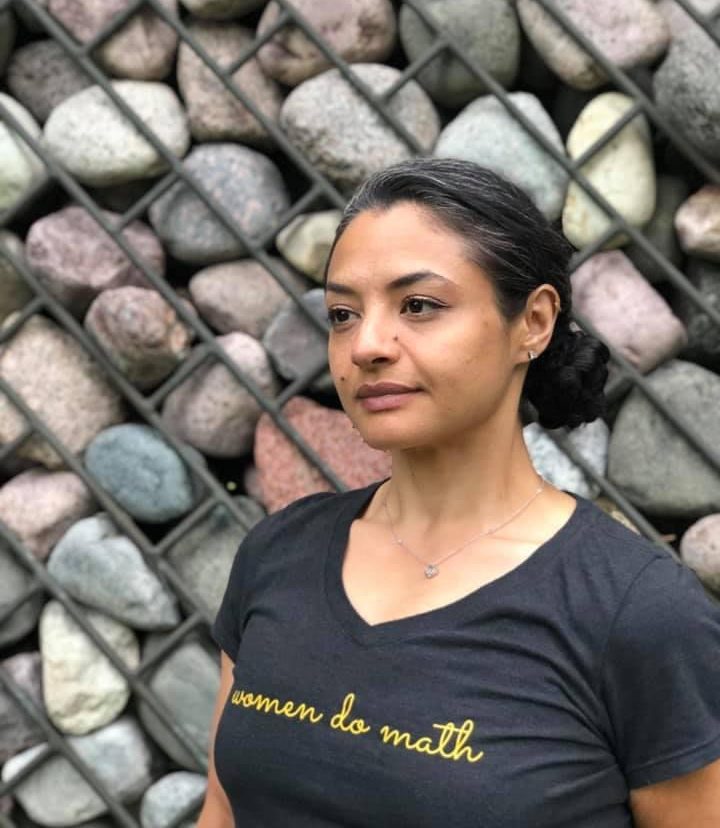Born in Guadalajara, Jalisco, Mexico • Birth year 1983 • Studied Mathematics at University of Wisconsin, Milwaukee in Milwaukee, WI, USA • Highest degree PhD in Mathematics • Lives in North Adams, MA, USA • Occupation Mathematics Professor
My love for math faded during my high school years. Being undocumented, living in the United States was challenging. Even though I was doing well academically, I thought I might never have the opportunity to attend college. I was sad, and at that time I turned to art as an outlet to deal with the challenges I was facing. I spent most of my senior year in high school in an art studio. I spent countless hours learning to draw, paint, and sculpt. I even dropped out of my calculus class just so that I could have more time to do art. I do not regret that choice, even though going a year without math courses hurt my mathematical skills. At the time, I needed something to help me deal with the anxiety and sadness I was experiencing, and art served me well.
There I had a meeting where my mentor said “when you go to graduate school”. I had no idea what graduate school was, but I knew that if she believed in me, then I should go to graduate school.
After graduating high school, I was able to enter community college. How that was possible is a story for another day, but the main thing is that, upon entering the program, my mathematical skills were well below calculus. My first college math course was intermediate algebra, where I (re?)learned how to factor polynomials. I vividly remember that day’s lesson where the professor said “To factor x^2+5x+6 we need to find two numbers that add to 5 and multiply to 6.” I immediately raised my hand, proudly announcing that numbers did not do that. How can two numbers multiply and add to something different? Luckily, the professor was very kind and she allowed me to think of examples. After discovering that 2 and 3 did the trick, I felt such joy in understanding something that I had taken for granted: numbers are amazing and in fact multiplication and addition are two distinct things! From there my story began to take shape.
After intermediate algebra I took all of the math courses the community college offered and later transferred to a four-year college to continue studying math. There I had a meeting where my mentor said “when you go to graduate school”. I had no idea what graduate school was, but I knew that if she believed in me, then I should go to graduate school. So, on I went!
My professional mission is to ensure that mathematics is a welcoming place for everyone, and I am eager to keep working on this for as long as I live.
I always knew that I would like to be a teacher. There is something so beautiful about seeing someone understand something. Most people call that an “aha” moment, and it truly is special. I also knew that education is a path out of poverty and into opportunity. Being an immigrant, I knew firsthand that having options is one key component to a happy life. So, I have always wanted to help others reach their goals and attain their dreams. However, it was not until almost the completion of my PhD that I decided to be a college professor. Finding this as a career option was great because it has allowed me to continue learning while doing research and teaching students. Creating new programs and platforms that provide mentorship and support for students from groups who have been historically excluded from higher education has also been deeply fulfilling. This outreach work keeps me grounded and reminds me that there is still a lot of work to be done in order for everyone to have meaningful and positive experiences with mathematics. My professional mission is to ensure that mathematics is a welcoming place for everyone, and I am eager to keep working on this for as long as I live.
Throughout those early years I could have used a larger community of support and to see others like me occupy positions and careers like those I had an interest in.
Being an immigrant, previously undocumented, and a Latina woman meant I rarely saw people like me in mathematics. Throughout those early years I could have used a larger community of support and to see others like me occupy positions and careers like those I had an interest in. Sadly, it took a long time to find a community of scholars who shared similar backgrounds and heritage. Yet this motivated much of my past work and inspired me and Drs. Alexander Diaz-Lopez, Alicia Prieto Langarica, and Gabriel Sosa to co-found the organization Lathisms: Latinxs and Hispanics in the Mathematical Sciences. Our goal is to share and amplify the contributions of Latinx/Hispanic scholars in math. We do this through a variety of means including Hispanic Heritage Month (in the US it is celebrated between September 15 and October 15) events, a podcast, and even a new book — Testimonios: Stories of Latinx and Hispanic Mathematicians. The book’s chapters will be freely available one per month starting in September 2021 and our hope is that this book provides a way for those within the community to learn of our stories while also giving advice to those who want to learn more about us and how to support our work. Although there is much work to be done so that those from historically excluded groups feel valued and uplifted in mathematics, I am hopeful that initiatives like Lathisms are making this reality possible.
Links:
Lathisms: Latinxs and Hispanics in the Mathematical Sciences
Testimonios: Stories of Latinx and Hispanic Mathematicians

